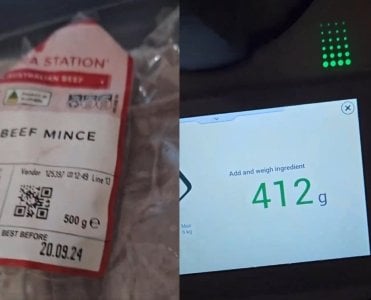Weighty issue at ALDI: Customers mince no words over alleged meat mislabelling!
- Replies 43
The convenience of supermarket shopping is something many take for granted.
We stroll through the aisles, trusting that what we toss into our carts is exactly what the label promises.
However, what happens when that trust is broken? This is the question on the minds of many after a recent incident at ALDI left customers feeling deceived and calling for action.
A disgruntled ALDI shopper has taken to social media to voice his frustration after discovering that a pack of three-star beef mince weighed significantly less upon inspection.
‘I Just bought some mince from ALDI, labelled 500g on the packet,’ the shopper said.
However, the customer's video, which quickly gained traction online, shows the meat on a set of scales, with the display revealing a weight of just 412g.
The shopper's dismay was palpable as he exclaimed, ‘What the hell, ALDI?’

The video sparked outrage among viewers, with some even urging a boycott of the supermarket chain.
The call to action spread like wildfire, with the phrase ‘Australia, boycott ALDI’ becoming a rallying cry for those who felt cheated.
However, amidst the uproar, some eagle-eyed commenters pointed out a small but crucial detail on the label.
‘The magic “e” indicates the actual weight will be less than advertised. Theoretically, it means the weight could be either under or over,’ one commenter pointed out.
‘The “e” next to the weight designates “estimate”. They [major supermarkets] all do it,’ another explained.
Globally, the mark is used to verify that the package's contents meet established criteria for estimation.
Despite this revelation, the sense of betrayal lingered, with many thanking the original poster for bringing the issue to light.
The shock was evident as a shopper remarked, ‘No way ALDI—almost 100g difference.’
It's a sentiment that resonates with many, as this isn't the first time customers have raised concerns over the accuracy of weight labels on meat products.
In a similar incident, a Woolworths shopper found their $11 lean beef mince to weigh only 784g, a far cry from the 1kg expected.
ALDI’s supplier partner has assured that they have systems in place to weigh their products and that any items not meeting their standards are rejected.
However, this assurance does little to quell the frustration of consumers who feel misled.
For those who find themselves in a similar situation, it's important to know your rights.
Consumers are encouraged to return products that do not meet their expectations for a full refund or a replacement.
This policy is a safeguard against the disappointment of purchasing goods that don't match their advertised specifications.
 Have you ever experienced something similar? How did you handle it? Did the supermarket make it right? Share your stories in the comments below and let's ensure that our collective voice is heard, and our shopping experiences remain honest and fair.
Have you ever experienced something similar? How did you handle it? Did the supermarket make it right? Share your stories in the comments below and let's ensure that our collective voice is heard, and our shopping experiences remain honest and fair.
We stroll through the aisles, trusting that what we toss into our carts is exactly what the label promises.
However, what happens when that trust is broken? This is the question on the minds of many after a recent incident at ALDI left customers feeling deceived and calling for action.
A disgruntled ALDI shopper has taken to social media to voice his frustration after discovering that a pack of three-star beef mince weighed significantly less upon inspection.
‘I Just bought some mince from ALDI, labelled 500g on the packet,’ the shopper said.
However, the customer's video, which quickly gained traction online, shows the meat on a set of scales, with the display revealing a weight of just 412g.
The shopper's dismay was palpable as he exclaimed, ‘What the hell, ALDI?’

An ALDI shopper was frustrated to find his 500g packet of beef mince weighed only 412g. Credit: X / @clowndownunder
The video sparked outrage among viewers, with some even urging a boycott of the supermarket chain.
The call to action spread like wildfire, with the phrase ‘Australia, boycott ALDI’ becoming a rallying cry for those who felt cheated.
However, amidst the uproar, some eagle-eyed commenters pointed out a small but crucial detail on the label.
‘The magic “e” indicates the actual weight will be less than advertised. Theoretically, it means the weight could be either under or over,’ one commenter pointed out.
‘The “e” next to the weight designates “estimate”. They [major supermarkets] all do it,’ another explained.
Globally, the mark is used to verify that the package's contents meet established criteria for estimation.
Despite this revelation, the sense of betrayal lingered, with many thanking the original poster for bringing the issue to light.
The shock was evident as a shopper remarked, ‘No way ALDI—almost 100g difference.’
It's a sentiment that resonates with many, as this isn't the first time customers have raised concerns over the accuracy of weight labels on meat products.
In a similar incident, a Woolworths shopper found their $11 lean beef mince to weigh only 784g, a far cry from the 1kg expected.
ALDI’s supplier partner has assured that they have systems in place to weigh their products and that any items not meeting their standards are rejected.
However, this assurance does little to quell the frustration of consumers who feel misled.
For those who find themselves in a similar situation, it's important to know your rights.
Consumers are encouraged to return products that do not meet their expectations for a full refund or a replacement.
This policy is a safeguard against the disappointment of purchasing goods that don't match their advertised specifications.
Key Takeaways
- An ALDI shopper expressed his frustration after discovering a 500g packet of beef mince weighed only 412g.
- The shopper's video on social media prompted calls from some to boycott ALDI, but others highlighted that the 'e' mark on the packet indicates an estimated weight.
- Discussion online also pointed out that this weight variance issue is not unique to ALDI and has occurred with other supermarkets.
- Although weight discrepancies have been reported, ALDI’s supplier partner is said to have systems in place to ensure accurate weights and offers refunds or replacements for unsatisfactory products.







